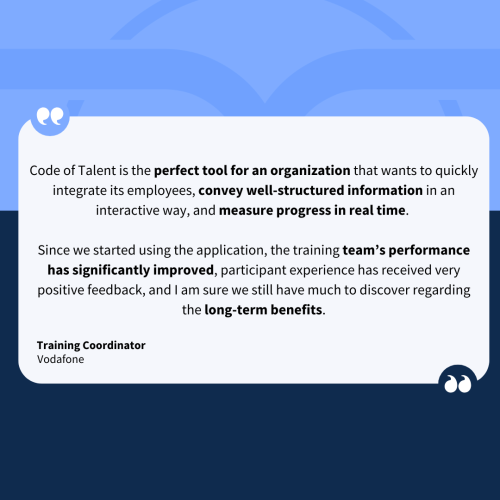Telecom companies are at a critical juncture as they navigate the rapid digital transformation within the industry. By 2026, global mobile data traffic will reach 77.5 exabytes per month, driven by the explosion of 5G, IoT, and connected devices. But what happens when your workforce isn’t equipped with the technical skills to manage the complexities of these new technologies?
The need for specialized technical skills training for employees in telecom is more urgent than ever. With roles as varied as sales representatives, customer service agents, field engineers, and network specialists, a one-size-fits-all approach to training is no longer sufficient.
This is where microlearning can help. This article explores the new landscape of complex technical skills that telecom companies need to upgrade in order to stay relevant in the industry and on top of their game.
The Dire Need for Technical Skills in the Telecom Industry
As we look ahead to 2025, the telecom industry is preparing for a huge leap forward. According to Deloitte’s 2025 Global telecom Outlook report, regions like Asia Pacific, Europe, Middle East, and Africa are projected to surpass half a trillion dollars in revenue each by 2027, while growth in the Americas will be modest at around 1% annually. With such promising projections and the advancements in generative AI and the race to develop 6G technology, the industry is set for major growth.
Training however, especially for technical skills, remains behind. Here are some of the reasons why technical skills training is essential for telecom employees:
Adapting to 5G
The rollout of 5G is pushing telecom companies to rapidly upskill their workforce. Network engineers and technicians now need to understand new systems and tools for the installation and maintenance of these technologies. Key technical skills for 5G deployment include:
- Programming skills
- Security architecture design
- AI algorithms
- Machine learning algorithms
- Network architecture design
- Understanding of IoT (Internet of Things)
The emergence of IoT also poses a challenge. Telecom workers need to be knowledgeable about new types of devices, systems integration, and connectivity protocols, which requires constant learning and technical skills development.
Development of AI for Customer Services
The integration of AI-powered chatbots and virtual assistants is transforming customer service in telecom. Sales representatives and customer service agents must now be familiar with AI tools to improve customer interactions and support.
McKinsey highlights how some telecom companies have already seen substantial improvements by using AI to assist customer service agents. For instance, one Latin American telecom company increased call center agent productivity by 25%, offering better customer experiences through AI-driven recommendations.
Cybersecurity and Data Privacy
With the increased data usage from 5G and the connection of more devices, telecom companies face a significant rise in cybersecurity risks. This expansion creates more entry points for potential cyberattacks, as more devices mean a larger attack surface for hackers to exploit. Companies must prioritize advanced cybersecurity measures, including training their workforce in compliance and risk issues.
Most recently, in February 2025, a breach in a Romanian branch of a global telecom company exposed sensitive customer information, including usernames and passwords of nearly 600,000 users. Scammers gained access to the company’s technical assistance ticket app, stealing this critical data.
When Training Can’t Keep Up with Industry Innovations
As the telecom industry rapidly evolves, many companies continue to treat training as a low priority, relying on outdated modules that lead to disengagement and, in some cases, critical errors. According to the Economic Times, nearly 65% of mid-sized companies prioritize soft skills training over technical training for new employees, suggesting a gap in role-specific technical development.
The traditional, one-size-fits-all approach to training is no longer effective. Here’s why:
- Different Roles, Different Needs: Sales representatives, field workers, and network engineers all need different types of technical skills. A single, generic training program can’t meet the specific needs of each role.
- Complex Systems Require Tailored Learning: The complexity of telecom systems means that employees need targeted, role-specific training in order to have the right skills to do their jobs effectively.
- Classroom Training Isn’t Fast Enough: Long, classroom-based courses are outdated. Telecom technologies evolve quickly, and employees need agile, on-demand learning options to stay current.
- Slow Training Leads to Falling Behind: Without modern, flexible training solutions, telecom companies risk falling behind in an industry that moves at lightning speed.
The Cost of Inaction: From Reputation Damages to Disruptive Mistakes
In a high-risk industry like telecom, the lack of engaging and effective training goes beyond the typical issues of employee disengagement, such as turnover and poor performance. It also leads to critical problems that can cost your business in the long run.
Failing to update training programs has serious consequences, including:
- Mistakes and Disruptions: Employees lacking sufficient technical skills can make costly mistakes, such as operational disruptions, poor customer experiences, delayed project timelines, incorrect troubleshooting, security vulnerabilities, and missed sales opportunities.
- Security Breaches: Inadequate cybersecurity training increases the risk of security breaches. A survey by the HIPAA Journal shows that 65% of employees admit to bypassing security policies to boost productivity. While this might seem like a shortcut to efficiency on paper, it can actually lead to serious, costly consequences.
- Fines and Reputation Damage: Insufficient compliance training can lead to hefty fines and damage to a company’s reputation. In high-risk industries like telecom, such mistakes can lead to both emotional and physical consequences, including safety hazards and the stress or anxiety caused by operational failures.
- Falling Behind Your Competitors: Telecom is a highly competitive environment. Upgrading technologies is not the only thing that gets you ahead of the race. According to the American Society for Training and Development, companies investing $1,595 per employee in training see a 24% higher profit margin than those that don’t.
The Power of Microlearning for Customized Technical Skills Training
Microlearning breaks down complex technical concepts into small, digestible modules. Employees can access these bite-sized lessons at their convenience, allowing them to absorb information at their own pace. With a focus on one concept at a time, microlearning boosts retention and application of technical skills.
Some of its benefits include:
1. Flexibility and On-Demand Access
Employees in the field, remote workers, and those in customer service can access training anytime, anywhere, making it easier for them to engage with training programs.
2. Improved Knowledge Retention
By focusing on small, manageable chunks of information, microlearning ensures that employees retain and can apply what they’ve learned in real-world scenarios.
3. Just-in-Time Learning
Telecom workers can access quick, focused tutorials when problems arise, such as a technician troubleshooting a network issue or a customer service agent resolving a technical query.
4. Consistent Updates
Microlearning can deliver real-time updates on new technologies, tools, or regulatory changes. This way, employees are always up to date with the latest industry standards.
5. Cost-Effective Training
By reducing the time and resources required for long training sessions, microlearning offers a more cost-effective solution for telecom companies than traditional learning methods.
6. Effective Compliance Training
Microlearning is perfect for compliance training, breaking down complex regulations into bite-sized modules that employees can quickly absorb.
7. Gamification Features for Engagement
Gamifying the learning process with badges, leaderboards, and rewards makes training fun and motivating. It encourages employees to complete training and retain key concepts through healthy competition and rewards.
8. Real-Time Feedback and Progress Tracking
Microlearning platforms provide instant feedback on progress, helping employees identify areas for improvement.
9. Scalability
As telecom companies grow, microlearning platforms can easily scale to accommodate a larger workforce. Employees from different regions or departments can access the same training materials, which is ideal for companies with a wide reach.
10. Tailoring Learning to Different Roles
Perhaps the most important feature of microlearning for telecom companies is its ability to tailor learning to different roles. Here’s how:
- For Field Workers: Technical training for field workers, such as installation and maintenance of 5G towers, can focus on specific equipment, troubleshooting, and safety procedures. Microlearning modules can guide them through real-time issues encountered in the field.
- For Sales Reps: Sales teams need to be trained on the technical benefits of the latest telecom products. Microlearning offers quick modules that explain product features, customer benefits, and troubleshooting tips for sales conversations.
- For Customer Service: Customer service agents must understand telecom products and AI systems to effectively assist customers. Microlearning keeps them updated on technical changes to services or troubleshooting processes.
Microlearning Platform for Technical Skills Training
Code of Talent’s platform provides a dynamic solution to the training challenges faced by telecom companies, particularly in developing employees’ technical skills.
Key features include personalized learning paths, gamified microlearning modules, real-time feedback and progress tracking, AI-powered content and mission generation, and an engaging, efficient learning model.
Hear It From Our Client
The Romanian branch of telecom giant Vodafone has been a long-standing client of Code of Talent, experiencing significant improvements in upskilling their employees. Key benefits included:
- Flexible Microlearning: Sales agents accessed bite-sized lessons anytime, anywhere, from any device.
- Engaging & Interactive Training: Gamification, quizzes, and interactive scenarios kept employees motivated.
- Social Learning & Collaboration: The platform encouraged teamwork and knowledge sharing.
- Powerful Tracking & Reporting: Vodafone easily monitored progress and ensured certification compliance.
- Stronger Sales Performance: Agents became more confident, knowledgeable, and skilled in consultative selling, leading to improved customer experiences.

Conclusion
In a rapidly evolving telecom landscape, staying ahead means equipping your workforce with the right technical skills, tailored to each unique role. With technologies like 5G, IoT, and AI transforming the industry, traditional training methods are no longer enough. Microlearning offers an efficient, flexible solution, enabling telecom companies to deliver targeted, on-demand training that boosts retention and performance.
Don’t let your team fall behind! Take action today and empower your workforce with the technical skills they need to excel in tomorrow’s telecom world. Partner with Code of Talent to create a future-ready workforce—because in telecom, agility and expertise are the keys to success. Try our free trial on upskilling now!
Cover photo: Freepik





